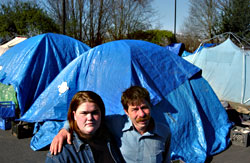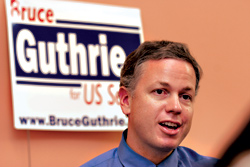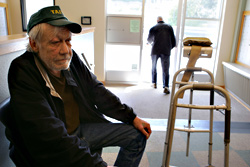Only a week before Seattle was faced with the prospect of three new homeless encampments popping up in city parks—and an inevitable battle among hundreds of homeless, homeowners, and Seattle police—something strange happened. The city of Seattle blinked. Or, more accurately, it punted.
It was a strange outcome and perhaps only a delay of an even stranger showdown between the city and the politically brazen group SHARE/WHEEL, organizer of the area’s current two tent cities. At issue was a city promise to cut off $270,000 in city funding for the group’s 14 indoor homeless shelters, which are scattered throughout the city, on April 1. Separate cuts would have also hit several other shelter providers in the city.
Late last week, city officials painted SHARE/WHEEL as a rogue organization that wouldn’t cooperate with new city funding requirements for a computerized “homeless management” system and, thus, was bringing the cuts—or revenue shifts, as Mayor Greg Nickels’ office spins them—upon itself.
But on Monday, March 20, the city extended SHARE/WHEEL’s funding for another month—along with that of other shelter providers—and avoided what would have been a political mess for Nickels and the City Council. It would have been an odd move on the city’s part, implementing the region’s 10-year plan to end homelessness by going after the very group that, in essence, forced local politicians to find the will to end homelessness.
The fracas isn’t the result of anything SHARE/WHEEL has done wrong in running its 14 small homeless shelters and two tent cities. It’s because of what the group won’t do under new city funding rules: provide clients’ identities to the government.
Both sides have valid points—and both sides are taking turns being equally strident and equally foolish. SHARE/WHEEL houses 250 people a night in indoor shelters, according to the group, and the city has no answers for where they would be housed once SHARE/WHEEL is cut off.
The city wants to create a computer tracking system, required under federal regulations, to determine whether the city’s $6.6 million investment in shelter and transitional services is producing results. The move is at the heart of the city’s shift from providing the homeless with mats on the floor of a traditional shelter to providing the homeless with transitional and permanent housing.
But for members of SHARE/WHEEL, the regulations smack of an invasion of privacy and, more broadly, an assault on their model of the homeless solving their problems through self-management.
“To give up my civil rights if I want to have any housing or health care, that’s not right,” says Leo Rhodes, a SHARE/WHEEL member.
Such talk may sound odd to citizens accustomed to handing over identifiers like their Social Security number for each visit to a doctor’s office. But Rhodes and others claim they’ve lost jobs once employers found out they were homeless.
“A lot of homeless people don’t want to be identified as homeless,” he says. “If you are struggling to get out of homelessness, then you don’t want to be stereotyped as being drunk, a druggie, mentally ill, or lazy.”
“SHARE/WHEEL leadership is making a big mistake,” says City Council member Tom Rasmussen.
But SHARE/WHEEL has always been a different organization, one that has long been willing to battle homelessness on its own terms even if it means being forced into the cold. As for the city, it’s defending a computer system that some shelter providers say isn’t fully functional and won’t be until later this year.
Founded in 1990, SHARE/WHEEL was begun, as were similar groups across the nation, to address the lack of shelter beds in cities like Seattle. The homeless still die on the streets of King County. In 2004, 82 died, according to the King County Medical Examiner. SHARE/WHEEL claims that 56 homeless died last year.
The group’s leaders believe that if the homeless are given consistent shelter, they can transition into their own long-term housing. The group also contends that it offers members the dignity, individuality, and anonymity that is missing from human-service agencies dominated by professional social workers.
Organized by Scott Morrow and Michele Marchand, the group’s first forays were low-tech. In the early 1990s, the group ran a shelter in a SoDo warehouse. But SHARE/WHEEL is best known for a series of tent cities—housing and political statement all in one—that the group has run over the years, often at odds with government officials. In 1998, Tent City 2 on Beacon Hill was bulldozed by the city. Two years later, the group was back in the tent city business, openly defying the city’s ban on public camping. This time, the city went to court. In 2003, SHARE/WHEEL and the city reached an agreement that allowed the group to operate one encampment as long as it wasn’t in a city park.
For a time, there was peace between the city and SHARE/WHEEL. The group gained a reputation for running the largely trouble-free Tent City 3, which moved every three months between vacant fields in the city and suburbs like Shoreline. Even the Seattle Police Department and King County Sheriff’s Office admitted that they were impressed with the operations.
But in 2004, the group upped the ante, announcing Tent City 4 on the Eastside, aiming to ensure that Eastsiders knew about homelessness on the other side of Lake Washington. Eastside residents protested the move, claiming that they feared for everything from the safety of schoolchildren to their own property values. That dynamic resulted in several memorable displays of suburban prejudice on television news programs. Eventually, the group worked out an arrangement that permitted it to encamp in Bothell. A later move to Kirkland resulted in similar uproars.
King County Executive Ron Sims recently said that witnessing that ugliness caused him to recommit to finding a way to end homelessness.
At each site, the group has largely disproved the worst fears of timid citizens. The encampments are clean and orderly. SHARE/WHEEL bans drunks and druggies from its tent cities and shelters. It runs warrant checks on potential clients. Twenty-five percent of SHARE/WHEEL clients are employed, according to the group, with many working day labor jobs in Seattle and elsewhere. The group claims that 46 percent of its clients leave the SHARE/WHEEL system within a year and find permanent housing.
And the group gets these results on the cheap—$2.50 a night per person in its indoor shelters versus about $11 a night per person in shelters run by mainstream organizations. The reason is the group is very bare-bones—its eight staffers each make $1,100 a month, perhaps 30 percent less than the lowest paid social worker—and SHARE/WHEEL’s clients require much less attention. They are high functioning, as the saying goes, compared to the many desperate cases at other shelters.
The group says that its two current tent cities—one on Capitol Hill, the other in Bellevue—cost about $4,000 a month each to operate and are not funded by the city or King County.
So why do so many public officials not like SHARE/WHEEL?
Part of the reason goes to Morrow and Marchand (the two refuse to talk to the media on the record). The group is often openly contemptuous of city officials, who typically expect everyone to make nice with them. What’s more, whispers have long circulated that the group is not democratic and that Morrow and Marchand are little more than puppet masters who control the homeless for their own political ends, according to current and former group members, as well as city officials.
“Scott [Morrow] really loves to control people,” says a man who goes by Mark Beast and lives in one of the group’s facilities. He says that SHARE/WHEEL is cultlike.
But the lack of love goes both ways.
“What motivation do we have to trust you?” asked Anitra Freeman, during a tense exchange with Seattle City Council member Rasmussen two weeks ago. Rasmussen was trying to explain why the new computerized system wouldn’t be a bad deal for the homeless.
“We’ve got to do things differently,” says Rasmussen, who chairs the council’s Housing, Human Services and Health Committee. “The old ways haven’t worked.”
Last year, Seattle and King County officials signed on to a 10-year plan to end homelessness (see “The Plan to Nowhere?” March 8). Under the plan, there would be little need for organizations like SHARE/WHEEL, the area’s lone peer-run homeless group. The plan calls for a system in which the homeless would quickly transition from the streets to permanent housing complete with so-called wraparound services. The only problem is that the plan is one year old and the 4,500 units of new permanent housing that the 10-year plan calls for either haven’t been built or haven’t been made available to the homeless.
Still, city officials in recent months have insisted that the city, where many of the county’s 8,000 homeless congregate, would see “no net loss” in traditional shelter beds as it transitions to the promised land of the 10-year plan.
Under the no-net-loss scenario, the city earlier announced funding cuts of $400,000 to organizations like the Downtown Emergency Service Center (DESC) and the Archdiocesan Housing Authority (AHA), for example. The city shifted the funds to newer transitional housing programs. Officials from DESC and AHA recently stated that they would likely have to cut shelter beds or enact temporary closures of their shelters in order to accommodate city cuts. AHA’s St. Martin de Porres shelter for disabled, chronic street alcoholics serves 212 men over 50 years old each night. Facing funding cuts, AHA says it would have to shut the shelter two days a week. The city also extended current funding for DESC, AHA, and the Salvation Army for one month.
On March 8, the city accepted applications from social-service agencies to compete for an additional $350,000 in funding. Results are expected to be announced later this week. But on Tuesday, March 21, Alan Painter, the city’s deputy director of the Human Services Department, said that the city would put off deciding who would receive those funds until sometime in April. SHARE/WHEEL, which applied for those funds, is still likely to be left out in the cold. The city has not made it clear where the group’s 250 shelter residents are expected to go. Painter said that the city may need to drum up additional monies beyond the $350,000 to address the SHARE/WHEEL situation.
SHARE/WHEEL’s application for funding this year was rejected by city officials because the group refused to comply with a new data collection system called Safe Harbors. The computerized database would include individual information about homeless persons obtaining services: name, date of birth, race, and gender, among other items.
In SHARE/WHEEL’s view, the new requirement amounts to the government tracking homeless persons. The city has held repeated meetings with SHARE/WHEEL members in an attempt to find a compromise. The city offered to accept unique identifiers of a person’s initials, date of birth, and gender. That wasn’t good enough for the group, which already collects data on its members, including age and gender but not names.
Freeman and others contend that even their initials will allow them to be tracked. SHARE/WHEEL has offered to turn over aggregate demographic data to the city.
Rasmussen and city officials continue to assert that the system will not be used to track individual homeless persons. Few in the SHARE/WHEEL camp believe that, however, and that leaves the city and the group at an impasse.
“It’s really short-sighted” to cut off SHARE/WHEEL, says Nicole Macri, a member of the Seattle/King County Coalition for the Homeless, a group that was one of the architects of the 10-year plan. Like other observers, Macri believes there is an element of political payback in the city’s insistence that SHARE/WHEEL cough up its clients’ identities. “To me, it seems strange that this is the reason they would cut SHARE off.”
In fact, federal regulations do not require that 100 percent of homeless persons be entered in the computerized system. According to Judy Summerfield, the city’s interim program manager of Safe Harbors, the feds expect 90 percent compliance. In King County, that would work out to about 800 people who wouldn’t need unique identifiers, far more than the number of homeless in the SHARE/WHEEL system.
End users of the Safe Harbors system say the city’s data requirement is causing problems and that the city has misplaced its priorities for ending homelessness.
“It’s hard to understand why they put Safe Harbors so far up the to-do list, when we have so much other stuff to do that produces services to people,” says M.J. Kiser, program director at the Compass Center, a homeless shelter provider. “Our case manager at our shelters is spending time putting data into the system instead of calling a mental-health provider or filling out a housing application to put someone in housing.” She says that the computerized system is not working as advertised by the city and that it’d be “optimistic” to expect it to within six months.
Still, the funding extension may only postpone a city versus SHARE/WHEEL fight another month.
“If they follow through and create three more tent cities, then all bets are off on how the city is going to respond,” says Tim Harris, executive director of Real Change. “My bet would be that the Nickels administration would not tolerate it for three minutes. They’ll play hardball.”
The city attorney’s office has already sent SHARE/WHEEL a letter, outlining that the group would violate its 2003 agreement with the city.
“We don’t want to go to war,” says Rhodes. “But these are shelter beds being lost.”








